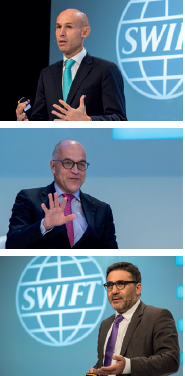WIFT at Sibos brought together three senior SWIFT executives to review Sibos 2016 and look ahead to next year’s event in Toronto.

PARTICIPANTS
Javier Pérez-Tasso, chief executive, Americas and UK region, SWIFT
Alain Raes, chief executive, EMEA and APAC, SWIFT
How would you compare this Sibos week to last year’s event in Singapore?
Alain Raes (AR): To be honest, the differences were fewer than I’d anticipated. I felt the same levels of energy and witnessed similar levels of engagement from senior executives in our community. What I did see, however, was a shift from discussion to demonstration. There was a move from highlighting the potential of technologies such as distributed ledger to demonstrating potential applications through proofs of concept.
Christian Sarafidis (CS): I’d agree with that. In the area of innovation, for example, I’d say we moved from education to experimentation. We’re no longer trying to explain what distributed ledger technology (DLT) is, for example, but are looking at use cases, such as in payments or securities; it’s become a lot more concrete.
AR: It’s certainly true that in Geneva, DLT was something you could now visualise. In general, I’d say technology is gaining a higher profile at Sibos. In terms of themes, FinTech, compliance and regulation were key topics in Singapore along with developments in the APAC region. This year, we still talked about compliance which remains a prime concern – particularly when it comes to cost – but cyber-security was clearly the dominant issue in Geneva, given the widely reported events earlier this year.
Javier Pérez-Tasso (JP-T): In that regard, what was evident was not just the level of interest of the community in tackling cyber-challenges, but also its recognition of the role of SWIFT in helping to address cyber-threats. SWIFT has mobilised around a Customer Security Programme (CSP) which supports customers in reinforcing the security of their SWIFT-related infrastructure. I found a clear understanding of the importance of customers securing their own operating environments, their connections with their counterparties, and also addressing the safety of the community as a whole.
AR: I think perceptions of SWIFT have changed as a result. Whereas it might have been perceived until recently as a traditional, slow-moving cooperative, in helping the industry address the cybercrime issue, SWIFT’s speed of action has been much appreciated. The same is true of innovation. The global payments innovation (gpi) initiative that we launched last year is moving very fast. A few of my customers came to me at Sibos and expressed surprise that SWIFT could move so fast on multiple fronts.
CS: There has certainly been significant progress on collaboration, experimentation and platforms. I really feel SWIFT has a crucial role to play in the financial services industry ecosystem. The demarcation line between the cooperative space and the competitive space is shifting. A clear example of this is cyber-security.There is an expectation that SWIFT will foster collaboration for the good of the industry. The same is true of compliance, which is not seen as a competitive differentiator. The cost of compliance is very high and is impacting business operations. This makes a collaborative model more attractive.

Javier Pérez-Tasso, Alain Raes and Christian
Sarafidis speaking at Sibos Geneva
In the area of correspondent banking, the SWIFT gpi initiative is a good illustration of the role platforms can play in the collaborative space. All correspondent banks need to be competitive, but they need to define common rules and principles to improve the customer experience. They can still compete, but, as I say, the demarcation line has shifted.
JP-T: The SWIFT gpi initiative is a good example, because it relates to one of our core franchises, correspondent banking.
As digitalisation has given rise to new expectations, and FinTech players have entered the competitive space, correspondent banking is clearly evolving. And what we have seen is that the predictability of both time and cost have become paramount to customer experience. The SWIFT gpi initiative is addressing both of these aspects: speed and transparency. However, it is not a stand-alone project in the transformation of correspondent banking. If you combine the speed, transparency and traceability of SWIFT gpi, together with the strong foundation provided by the CSP and our evolving financial crime compliance portfolio, I truly believe we will bring correspondent banking to a new level.
So far, the issues you’ve raised all revolve around SWIFT initiatives. Does this signal a change in the relationship between SWIFT and Sibos?
AR: This is indeed one of the first ‘Siboses’ where I see a recognition that Sibos is a SWIFT event. Before now, it was largely regarded as an event organised by SWIFT, but which participants attended in order to meet other participants. Now they are also coming to meet with SWIFT. The CSP certainly had something to do with that impression, but the same is true of innovation, SWIFT gpi and other areas. The company is changing.
CS: I’d say that, compared to previous years, we’ve moved from general industry issues to specific topics that are close to SWIFT’s areas of expertise.
Does this reflect a change in the mind-set of the community?
CS: It comes from both sides in my view. We’re really moving into the realm of co-creation. The SWIFT gpi initiative is an example of co-creation. SWIFT took the step to help improve the correspondent banking experience, but decided together with the banks what made sense. Correspondent banking is a very competitive space, but there is still a need for collaboration toaddress common challenges. With the response from our SWIFT gpi members, you can really sense the progress we’re making together.
What learnings did you draw from this year’s Sibos that you can take forward to Toronto?
JP-T: Well, alongside innovation as Christian has mentioned, clearly one of the most significant learnings is the commitment and alignment across the industry to address cyber-challenges and to collaborate with SWIFT as we roll out the CSP. As we announced to the community, we will be introducing a set of core security standards,
including 16 mandatory controls that all SWIFT customers must meet from Q2 2017. Compliance against the controls will be assured through a combination of customer self-attestation and sample inspections. Information on the compliance status of customers will be made available to their counterparts (for example, via the KYC registry) to help inform decisions about their counterparts.
And while cyber will still be high on the agenda in Toronto, it is clear that the world doesn’t stand still. Innovation and the SWIFT2020 strategy will still be front and centre as well.
CS: The possible use of the KYC Registry to disseminate CSP-related information is an example of how platforms do not, and should not, exist in isolation. When we launched the KYC Registry, we were looking through the lens of compliance, but we believe it could also play a role in cyber-security. We want to be able to reuse platforms and bring innovation to bear in different areas.
JP-T: Collaboration is crucial in both compliance and customer security. It’s important to recognise that customers do not operate in a vacuum. We have 11,000+ users who do business with each other and they have hundreds, sometimes even thousands, of correspondent relationships. In cyber, as we heard at Sibos, only the paranoid survive. You need to assume that the worst can happen and that either you or your counterparty may be breached. In addition to the existing RMA application, we will be introducing tools such as daily validation reports to help detect and address any possible breaches.
And beyond direct counterparty relationships, the industry needs to work together even more broadly as a global community to share and prepare based on the latest cyber-threat intelligence information. That’s why we have reminded every SWIFT customer about their responsibility to share information with us if they suspect they may have been breached. Our dedicated Customer Security Intelligence team shares back relevant anonymised information on malware and indicators of compromise, to help prevent attackers from using the same modus operandi to strike again elsewhere.
Is there anything new that you anticipate for Sibos in Toronto or is it too early to talk about that?
JP-T: I’m sure Toronto will be a very exciting host city for Sibos. It is a major centre of innovation with the MaRS Discovery District putting Toronto on the map as a vibrant FinTech hub. And Canada as a whole is in the midst of a significant payments modernisation programme, which will no doubt influence the agenda over the coming year.
AR: This was my 26th Sibos and it is always amazing to me to see how well organised it is. I’m proud to be part of it and am already looking forward to Sibos 2017!(News source:SWIFT)


